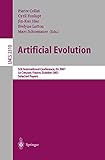Artificial Evolution [electronic resource] : 5th International Conference, Evolution Artificielle, EA 2001 Le Creusot, France, October 29–31, 2001 Selected Papers / edited by Pierre Collet, Cyril Fonlupt, Jin-Kao Hao, Evelyne Lutton, Marc Schoenauer.
Material type: TextSeries: Lecture Notes in Computer Science ; 2310Publisher: Berlin, Heidelberg : Springer Berlin Heidelberg, 2002Description: XI, 374 p. online resourceContent type: text Media type: computer Carrier type: online resourceISBN: 9783540460336Subject(s): Computer science | Computer software | Electronic data processing | Artificial intelligence | Optical pattern recognition | Computer Science | Computation by Abstract Devices | Algorithm Analysis and Problem Complexity | Artificial Intelligence (incl. Robotics) | Pattern Recognition | Numeric ComputingAdditional physical formats: Printed edition:: No titleDDC classification: 004.0151 LOC classification: QA75.5-76.95Online resources: Click here to access online
TextSeries: Lecture Notes in Computer Science ; 2310Publisher: Berlin, Heidelberg : Springer Berlin Heidelberg, 2002Description: XI, 374 p. online resourceContent type: text Media type: computer Carrier type: online resourceISBN: 9783540460336Subject(s): Computer science | Computer software | Electronic data processing | Artificial intelligence | Optical pattern recognition | Computer Science | Computation by Abstract Devices | Algorithm Analysis and Problem Complexity | Artificial Intelligence (incl. Robotics) | Pattern Recognition | Numeric ComputingAdditional physical formats: Printed edition:: No titleDDC classification: 004.0151 LOC classification: QA75.5-76.95Online resources: Click here to access online  E-BOOKS
E-BOOKS
| Current library | Home library | Call number | Materials specified | URL | Status | Date due | Barcode |
|---|---|---|---|---|---|---|---|
| IMSc Library | IMSc Library | Link to resource | Available | EBK5673 |
Invited Paper -- Why Biologists and Computer Scientists Should Work Together -- Theoretical Issues -- Niching in Monte Carlo Filtering Algorithms -- Measurement of Population Diversity -- Prediction of Binary Sequences by Evolving Finite State Machines -- Extending Selection Learning toward Fixed-Length d-Ary Strings -- Markov Random Field Modelling of Royal Road Genetic Algorithms -- Measuring the Spatial Dispersion of Evolutionary Search Processes: Application to Walksat -- Algorithmic Issues -- The Importance of Selection Mechanisms in Distribution Estimation Algorithms -- Surrogate Deterministic Mutation: Preliminary Results -- The Effects of Partial Restarts in Evolutionary Search -- History and Immortality in Evolutionary Computation -- Applications -- Origins and Learnability of Syllable Systems: A Cultural Evolutionary Model -- Evolution Strategy in Portfolio Optimization -- Scatter Search for Graph Coloring -- The Two Stage Continuous Parallel Flow Shop Problem with Limited Storage: Modeling and Algorithms -- SAT, Local Search Dynamics and Density of States -- A Multiobjective Evolutionary Algorithm for Car Front End Design -- Implementation Issues -- EASEA Comparisons on Test Functions: GALib versus EO -- Evolving Objects: A General Purpose Evolutionary Computation Library -- Genetic Programming -- Backwarding: An Overfitting Control for Genetic Programming in a Remote Sensing Application -- Avoiding the Bloat with Stochastic Grammar-Based Genetic Programming -- Applying Boosting Techniques to Genetic Programming -- Constraints Handling -- Dual Evolutionary Optimization -- Using Evolutionary Algorithms Incorporating the Augmented Lagrangian Penalty Function to Solve Discrete and Continuous Constrained Non-linear Optimal Control Problems -- Coevolution and Agents Systems -- Cooperative Coevolution for Learning Fuzzy Rule-Based Systems -- Evolving Cooperative Ecosystems: A Multi-agent Simulation of Deforestation Activities -- The Impact of Environmental Structure on the Evolutionary Trajectories of a Foraging Agent -- Learning as a Consequence of Selection -- Coevolution and Evolving Parallel Cellular Automata-Based Scheduling Algorithms.
The Evolution Arti?cielle cycle of conferences was originally initiated as a forum for the French-speaking evolutionary computation community. Previous EA m- tings were held in Toulouse (EA’94), Brest (EA’95, LNCS 1063), Nˆ?mes (EA’97, LNCS 1363), Dunkerque (EA’99, LNCS 1829), and ?nally, EA 2001 was hosted by the Universit´e de Bourgogne in the small town of Le Creusot, in an area of France renowned for its excellent wines. However, the EA conferences have been receiving more and more papers from the international community: this conference can be considered fully internat- nal, with 39submissions from non-francophonic countries on all ?ve continents, out of a total of 68. Out of these 68 papers, only 28 were presented orally (41%) due to the formula of the conference (single session with presentations of 30 minutes) that all participants seem to appreciate a lot. The Organizing Committee wishes to thank the members of the International Program Committee for their hard work (mainly due to the large number of submissions) and for the service they rendered to the community by ensuring the high scienti?c content of the papers presented. Actually, the overall quality of the papers presented was very high and all 28 presentations are included in this volume, grouped in 8 sections which more or less re?ect the organization of the oral session: 1. Invited Paper: P. Bentley gave a great talk on his classi?cation of int- disciplinary collaborations, and showed us some of his work with musicians and biologists.


There are no comments on this title.